Natural Solutions to Things That Bug You (34 page)
Read Natural Solutions to Things That Bug You Online
Authors: Myles Bader
EASTERN TENT CATERPILLAR
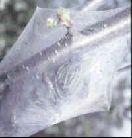
Identification:
The Eastern Tent Caterpillar has white stripes down their back as well as yellow and brown lines and blue spots on their sides. They spin tent-like waterproof webs, which is their distinct characteristic.
Tent caterpillar Web
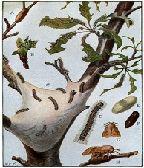
General Information:
They will eat fruit and leaves but will not touch an evergreen tree. They lay their eggs in masses that will encircle twigs and they will hatch in the spring. There can be up to 300 caterpillars in a single web and they can remove all the leaves on a tree in a very short period of time. They are more active in the spring and make large tents or webs between tree branches.
SPRAY THE LEAVES
There are a number of ways to eliminate this pest. You can spray the leaves with Bt or a solution of lime and soap directly on the caterpillars. Lacewings, Bt and trichogramma wasps will also do the job.
SEAWEED TO THE RESCUE
Go down to the beach and collect seaweed and place the seaweed in all the crotches of the tree. This needs to be done in the spring to repel the caterpillars. As the seaweed disintegrates it also makes excellent mulch, full of trace minerals.
GET OUT THE MAGNIFYING GLASS AND YOUR OVERCOAT
Check the tree in the winter months for egg masses and remove them and place them into a bucket of soapy water.
TAKE DOWN THE TENT
Remove all the tents that you can locate and place them in a bucket of soapy water, which will kill them.
GET OUT THE LADDER
One of the easiest methods of controlling the caterpillar is to use a large stick or broom handle and when the caterpillars are in their nest (usually when it rains or at noon) poke the stick into the nest and roll it around. The fibers in the nest are sticky and will adhere to the stick. Squash them or place the nest in a bucket of soapy water.
GARDEN WEBWORM
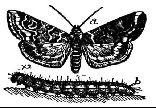
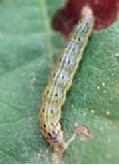 This worm attacks beets, beans, corn, strawberries and peas primarily. They make webs from leaves and consume them. They may be found in a variety of colors but most have three dark spots on each side of each segment with one to three bristle-like hairs growing from each segment. All webbed leaves must be clipped off and destroyed.
This worm attacks beets, beans, corn, strawberries and peas primarily. They make webs from leaves and consume them. They may be found in a variety of colors but most have three dark spots on each side of each segment with one to three bristle-like hairs growing from each segment. All webbed leaves must be clipped off and destroyed.
GREEN FRUITWORM
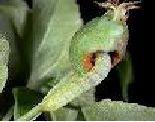 These worms attack apple fruit trees and strawberries and feed on the leaves, tying them together with silk. They will do damage to fruit and begin their attack at petal fall. They are a large green caterpillar and are sometimes speckled. The mature ones have a cream-colored line down their backs. The best control is to use Bt.
These worms attack apple fruit trees and strawberries and feed on the leaves, tying them together with silk. They will do damage to fruit and begin their attack at petal fall. They are a large green caterpillar and are sometimes speckled. The mature ones have a cream-colored line down their backs. The best control is to use Bt.
Adult Fruitworm
GYPSY MOTH LARVAE
Identification:
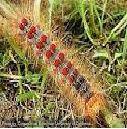 These are 2 inch long gray caterpillars that little brown tufts of brown and yellow hairs extending from their sides. They also have 10 blue spots followed by 12 red spots on their back. If you find one there will be plenty more where they came from.
These are 2 inch long gray caterpillars that little brown tufts of brown and yellow hairs extending from their sides. They also have 10 blue spots followed by 12 red spots on their back. If you find one there will be plenty more where they came from.
General Information:
They will totally defoliate a tree and kill it. After they kill the tree they will leave and look for another tree or work on your plants for dessert. They are usually only found from New England to West Virginia and are now being seen in other states. They leave large brown egg masses on trees.
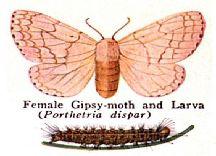
PICK ME A CATERPILLAR
If you tie a rope around the tree and place a burlap bag on the rope the caterpillars will rest there for some time to chat about their daily activities. This will give you plenty of time to interrupt them and drive them 10 miles from your property and release them, or just snuff them out where they stand.
CHASE THEM DOWN WITH PARASITES
Control can be effective with a number of parasites such as the lacewing,
Glyptapanteles flavicoxis
and
Cotesia melanoscelus
.
The eggs contain a scale that the trichogramma cannot seem to break. Spray Nc nematodes around the base of trees to kill migrating caterpillars.
 The foliage should be sprayed with Bt or NPV at the first sign of an impending attack. You can also spray the Nc around the tree trunk.
The foliage should be sprayed with Bt or NPV at the first sign of an impending attack. You can also spray the Nc around the tree trunk.
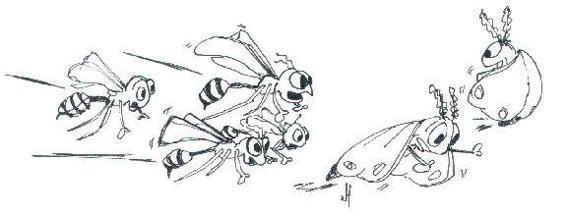
MOUNTAIN ASH SAWFLY
General Information:
 This tiny green caterpillar is only about ½ inches long and is covered with spines. They will strip the leaves and skeletonize them, leaving only the ribs and veins. They prefer the leaves at the top of the plant or tree. They will appear around the middle of May and are usually found only in the northeastern United States.
This tiny green caterpillar is only about ½ inches long and is covered with spines. They will strip the leaves and skeletonize them, leaving only the ribs and veins. They prefer the leaves at the top of the plant or tree. They will appear around the middle of May and are usually found only in the northeastern United States.